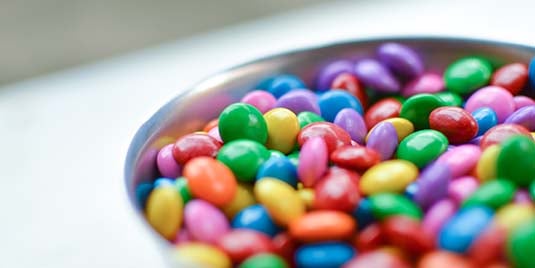My emotional reliance on sugar fueled mood swings and poor health. Letting go helped me find balance and joy.
“Would you like a piece of cake?” a coworker asked as she thrust a chocolate square dripping with frosting at me. My response of “No, thank you” was met with a quizzical look.
Being able to “Just Say No” to chocolate cake was once impossible for me. For much of my adulthood, my reflex move for overwhelming feelings was to numb them with sugar and other mood-altering substances.
How Sugar Became My Comfort and Escape in Childhood
Sugar and I began our dysfunctional relationship when I was five years old. My gentle, playful mother had died two years earlier, and my new living situation with relatives proved traumatic. Looking through old photos of myself, I can see a carefree three-year-old morphing into a haunted kindergartner.
The way I was treated in that household cost me my appetite. After months of tea, toast, and little else, my bones protruded. Then, while visiting another family one day, I ate an entire sponge cake — one crispy, airy, perfectly not-too-sweet, slender slice at a time.
RELATED: Bipolar Disorder and Sugar: How We Unintentionally Sabotage Our Stability
After the first serving, it was as if someone had turned up the volume. I suddenly felt alert and in tune with my surroundings. Bye-bye, self-starvation. Sugar, via a homemade cake, saved my life.
Sugar, my elixir, became something to look forward to. It soothed my feelings and revved up my senses. I used it to coat over whatever ugliness I experienced at home.
Struggling With Food, Body Size, and Mood in Adolescence and Beyond
My relationship with food got more complicated in adolescence. When I was 16, a relative noticed that I had gained a little weight and taught me how to fast. As a freshman in college — the year I experienced my first immobilizing depression — I began bouncing between compulsive overeating and crash dieting.
Every summer, the arrival of bikini season became my cue to deprive myself of sustenance. I’m sure the stress on my system contributed to a cycle of manic episodes and hospitalizations.
RELATED: Bipolar and Binge Eating: How I Broke Free
Thankfully, at 26, my last hospitalization broke that seasonal cycle. The program there provided me with comprehensive treatment and outpatient therapy — and weaned me off various prescription tranquilizers that had become another self-soothing addiction.
Not all my issues were magically resolved, though, and I returned to sweet indulgences and food binges.
Creating Peace With My Relationships With Sugar
After umpteen attempts, I finally broke up with sugar for good at the age of 40. Desperation, ignited by a medical challenge, motivated me to seek the support of a 12-step community.
The physical side of easing off sugar was excruciating at first, but I trusted those who said the cravings would pass. They did.
Sugar may not be inherently harmful, but it can become problematic when consumed without moderation or used as a way to soothe emotional distress.
RELATED: Sugar and Bipolar: The Bittersweet Struggle
Within a few months, the overwhelming longing had subsided to mere desire. Oatmeal with fresh fruit, walnut bits, and a sprinkling of cinnamon sugar replaced apple pie, brownies, cinnamon rolls, ice cream, and the rest of my sugar fixes.
Yet, getting myself in order emotionally took longer. Life without overindulging in sugar meant learning how to feel it now because sugar had served as my mechanism for attempting to feel it never.
Finding Freedom Through Recovery, Nutrition, and Self-Acceptance
Embracing 12-step-based recovery principles gave me tools for sorting out my feelings, which helped me fight self-disapproval, anxiety, and mild depression. I learned how to reframe, step back and examine my part, focus on the solution instead of the problem, practice acceptance, and much more.
I also learned that I feel things more deeply than most. Unless I channel that empathy into my paid work, volunteer work, or writing, I get knots within me that grow tighter and tighter until double fudge brownies start up their siren song with the promise of relief.
Giving up sugar as my primary coping mechanism eliminated one major trigger for mood swings. Moderating my relationship with sugar was part of a larger switch in my entire approach to nutrition, which also benefited my overall physical health.
Even better, the fact that I finally overcame this particular addiction opened me up to take on other challenges, such as performing stand-up comedy, playing soccer, and learning to like myself — though that last one is a work in progress.
UPDATED: Printed as “So Long, Sugar,” Winter 2020


